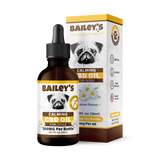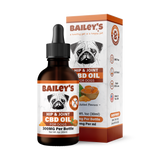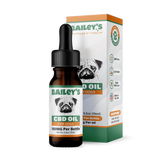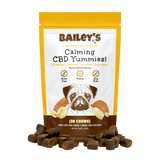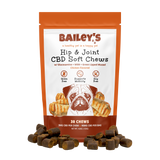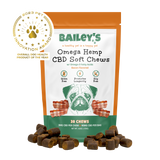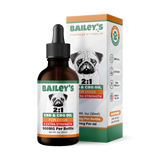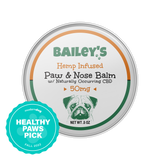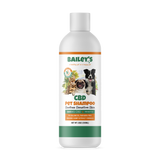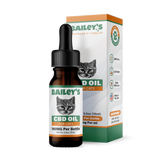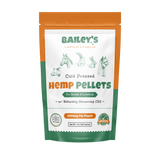Quinoa and Dogs: Canines and Grain

Quinoa has gained popularity as a nutritious grain alternative, but what about our furry friends? Can dogs benefit from incorporating quinoa into their diets?

In this article, the friendly folks at Bailey’s CBD help us explore the nutritional aspects of quinoa and discuss its potential benefits and risks for canines. We will also describe how best to prepare quinoa for your dog and present expert opinions on this topic.
Table of Contents
1. Understanding Quinoa: A Nutritional Overview
Quinoa, pronounced keen-wah, is a pseudocereal that originated in the Andean region of South America. Despite its grain-like appearance, quinoa is actually a seed. It has gained popularity in recent years due to its impressive nutritional profile.
Quinoa has been cultivated for thousands of years by indigenous people in the Andean region. Its popularity has grown globally due to its exceptional nutritional value and versatility in culinary applications. Quinoa is an excellent source of protein, fiber, and essential nutrients.
1.1 The Origin and Popularity of Quinoa
Quinoa, known scientifically as Chenopodium quinoa, has a long history dating back to the Inca civilization. The Inca people considered quinoa to be sacred and referred to it as the "mother grain." They recognized its nutritional value and relied on it as a staple food in their diet.
Over time, quinoa's popularity spread beyond the Andean region. In the 1980s, the United States and Europe started to embrace quinoa as a nutritious alternative to traditional grains. Its unique texture, mild flavor, and versatility in various dishes made it a favorite among health-conscious individuals and culinary enthusiasts.
Today, quinoa is grown not only in its native South America but also in other parts of the world, including the United States, Canada, and Europe. Its cultivation has expanded to meet the increasing demand for this superfood.
1.2 Nutritional Components of Quinoa
Quinoa is packed with essential nutrients that can contribute to a well-balanced diet. It is rich in protein, containing all nine essential amino acids. This makes it a complete protein source, which is particularly beneficial for individuals following vegetarian or vegan diets.
Protein is essential for various bodily functions, including muscle growth and repair, hormone production, and immune system support. Quinoa's high protein content makes it an excellent choice for athletes and individuals looking to increase their protein intake.
In addition to protein, quinoa is a good source of dietary fiber, which aids in digestion and promotes bowel regularity. The fiber content in quinoa helps regulate blood sugar levels, prevent constipation, and support healthy weight management.
Quinoa is also a rich source of vitamins and minerals. It contains significant amounts of magnesium, which plays a crucial role in energy production, muscle function, and bone health. Phosphorus, another mineral found in quinoa, is essential for maintaining healthy teeth and bones. Additionally, quinoa provides manganese, which is involved in the metabolism of carbohydrates, amino acids, and cholesterol.
Furthermore, quinoa is naturally gluten-free, making it an excellent choice for individuals with gluten sensitivity or celiac disease. Its gluten-free status has contributed to its popularity as a substitute for wheat-based grains in various recipes.
Overall, quinoa's nutritional composition makes it a valuable addition to a balanced diet. Its versatility allows for creative culinary exploration while providing numerous health benefits.
2. Canines and Their Dietary Needs
Before we delve into the potential benefits of quinoa for dogs, let's first understand the dietary needs of our canine companions.
Canines, like humans, require a balanced diet that provides them with essential nutrients to support their overall health and well-being. These nutrients include proteins, fats, carbohydrates, vitamins, and minerals. Each nutrient plays a crucial role in their growth, development, and immune function. And like humans, dogs enjoy the occasional treat or may need additional dietary supplements but they should not become central to your furry friend’s eating habits.
Proteins are essential for dogs as they provide the building blocks for their muscles, tissues, and organs. They also play a vital role in the production of enzymes and hormones. Good sources of protein for dogs include meat, fish, eggs, and dairy products.
Fats are another important component of a dog's diet. They provide a concentrated source of energy and help in the absorption of fat-soluble vitamins. Fats also contribute to healthy skin and coat, as well as support the proper functioning of the nervous system. Sources of healthy fats for dogs include fish oil, flaxseed oil, and chicken fat.
Carbohydrates, although not essential for dogs, can still be beneficial. They provide a readily available source of energy and can help regulate blood sugar levels. Good sources of carbohydrates for dogs include grains, vegetables, and fruits.
2.1 The Role of Grains in a Dog's Diet
Grains are a controversial topic in canine nutrition. While some believe dogs thrive on a grain-free diet, others argue that grains can be a valuable source of energy and nutrients for our furry friends. It is important to note that dogs are omnivores, meaning they can digest and derive nutrients from both animal and plant-based sources.
Grains, including quinoa, can provide dogs with complex carbohydrates, which serve as a valuable energy source. They are also a source of dietary fiber, aiding in digestion and promoting a healthy gut.
Quinoa, in particular, is a gluten-free grain that is rich in essential amino acids, vitamins, and minerals. It is considered a complete protein, meaning it contains all nine essential amino acids that dogs need for optimal health. Quinoa is also high in fiber, which can help regulate digestion and promote a feeling of fullness.
When incorporating grains into a dog's diet, it is important to choose whole grains that are minimally processed and free from additives. This ensures that dogs receive the maximum nutritional benefits from these grains.
It is worth noting that every dog is unique, and their dietary needs may vary. It is always best to consult with a veterinarian before making any significant changes to your dog's diet, including the introduction of new grains like quinoa.
3. Quinoa and Dogs: A Possible Match?
Now that we have examined the nutritional aspects of quinoa and canine dietary needs, let's explore the potential benefits and risks of incorporating quinoa into a dog's diet.
But before we dive into the details, let's take a moment to understand the origins of quinoa and its rise in popularity. Quinoa, pronounced "keen-wah," is a grain-like seed that has been cultivated for thousands of years in the Andean region of South America. It was a staple food for the ancient Incas and is known for its high nutritional value.
Now, let's move on to the benefits of quinoa for dogs.
3.1 Benefits of Quinoa for Dogs
Quinoa can be a nutritious addition to a dog's diet when introduced properly and in moderation. Its high protein content and complete amino acid profile make it a valuable source of plant-based protein for canines. Dogs require protein for various bodily functions, including muscle development, tissue repair, and hormone production. Including quinoa in their diet can help meet their protein needs.
Furthermore, quinoa is rich in essential minerals such as magnesium, phosphorus, and manganese. These minerals play a crucial role in maintaining healthy bones, teeth, and overall bodily functions. Quinoa also contains vitamins like folate, vitamin E, and B vitamins, which contribute to a dog's overall health and vitality.
Additionally, quinoa is gluten-free, making it a suitable option for dogs with grain sensitivities or allergies. It can serve as an alternative to traditional grains such as wheat, corn, or soy. This is particularly beneficial for dogs with food sensitivities or those following a grain-free diet.
Now that we have explored the benefits, let's move on to the potential risks and precautions of feeding quinoa to dogs.
3.2 Potential Risks and Precautions
While quinoa offers several potential benefits, it is important to exercise caution when feeding it to dogs. Some dogs may have difficulty digesting quinoa, leading to digestive upset or discomfort. Therefore, it is crucial to introduce quinoa gradually and monitor your dog's response.
It is also worth noting that quinoa contains saponins, natural compounds that can irritate a dog’s digestive system. To minimize the risk, it is recommended to rinse quinoa thoroughly before cooking to remove these compounds.
Furthermore, quinoa should never replace a complete and balanced dog food diet. It should be used as a supplement in small quantities, ensuring that it does not exceed more than 10% of your dog's daily caloric intake. A well-rounded diet that includes high-quality dog food formulated specifically for their nutritional needs is essential for their overall health and well-being.
As with any dietary changes, it is always best to consult with your veterinarian before introducing quinoa or any new food, treats, or supplements into your dog's diet. They can provide personalized advice based on your dog's specific needs and health.
While quinoa can offer potential benefits as a nutritious addition to a dog's diet, it is important to introduce it gradually, monitor your dog's response, and ensure it is used as a supplement rather than a replacement for a complete and balanced diet. With proper precautions and guidance from your veterinarian, quinoa can be a healthy and tasty addition to your furry friend's meals.

4. Preparing Quinoa for Your Dog
If you decide to incorporate quinoa into your dog's meals, it is important to prepare it properly to maximize its nutritional benefits and minimize any potential digestive issues.
4.1 Cooking Methods for Quinoa
To cook quinoa for your dog, rinse it thoroughly to remove any bitter residue. Then, cook it according to the package instructions using water or low-sodium broth. Avoid adding any salt or seasonings that may be harmful to dogs.
4.2 Incorporating Quinoa into Your Dog's Meals
Quinoa can be served mixed with your dog's regular food or as a standalone ingredient in homemade dog treats. It is essential to adjust the portion size based on your dog's size, weight, and overall dietary requirements. Consult with your veterinarian or a veterinary nutritionist to determine the appropriate portion size for your dog.
5. Expert Opinions on Quinoa and Canine Health
Now, let's hear from the experts - veterinarians and nutritionists - on their perspectives regarding quinoa and its suitability for dogs.
5.1 Veterinarian Views on Quinoa
Many veterinarians agree that quinoa can be a beneficial addition to a dog's diet. It provides essential nutrients and can serve as an alternative protein source for dogs with dietary restrictions or intolerances. However, it is crucial to ensure that quinoa is introduced properly and does not replace a balanced dog food diet.
5.2 Nutritionist Perspectives on Grains for Dogs
Nutritionists emphasize that the inclusion of grains in a dog's diet is a personal choice and should be based on the individual dog's needs and sensitivities. While dogs can benefit from carbohydrates found in grains like quinoa, it is important to ensure that these grains are of high quality and do not contribute to any allergic reactions or digestive issues.
6. Conclusion
In conclusion, quinoa can be a nutritious addition to a dog's diet when introduced properly and in moderation. It provides valuable protein, fiber, and essential nutrients. However, it should never replace a complete and balanced dog food diet. It is crucial to consult with your veterinarian or a veterinary nutritionist before introducing quinoa or making any dietary, supplementary, or treat changes for your furry friend. With proper preparation and monitoring, quinoa can contribute to your dog's overall health and well-being.

